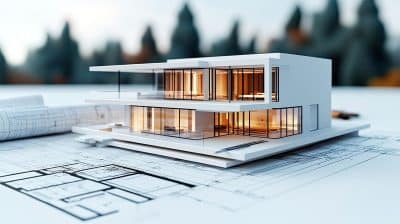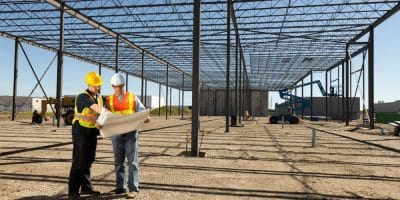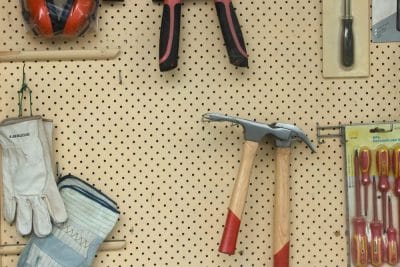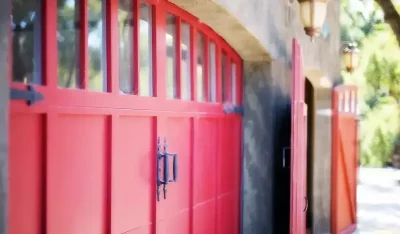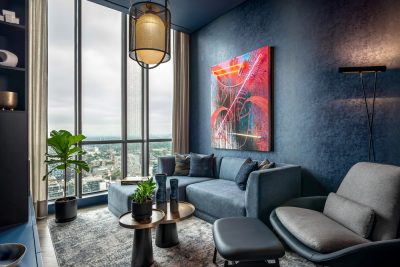Choosing the right type of residential fence is essential for balancing functionality, durability, and style. Each material comes with its unique benefits and limitations, making it crucial to evaluate your priorities, such as privacy, security, aesthetics, or maintenance. Below, we explore the most common types of residential fences, along with their pros and cons to help you make an informed decision.
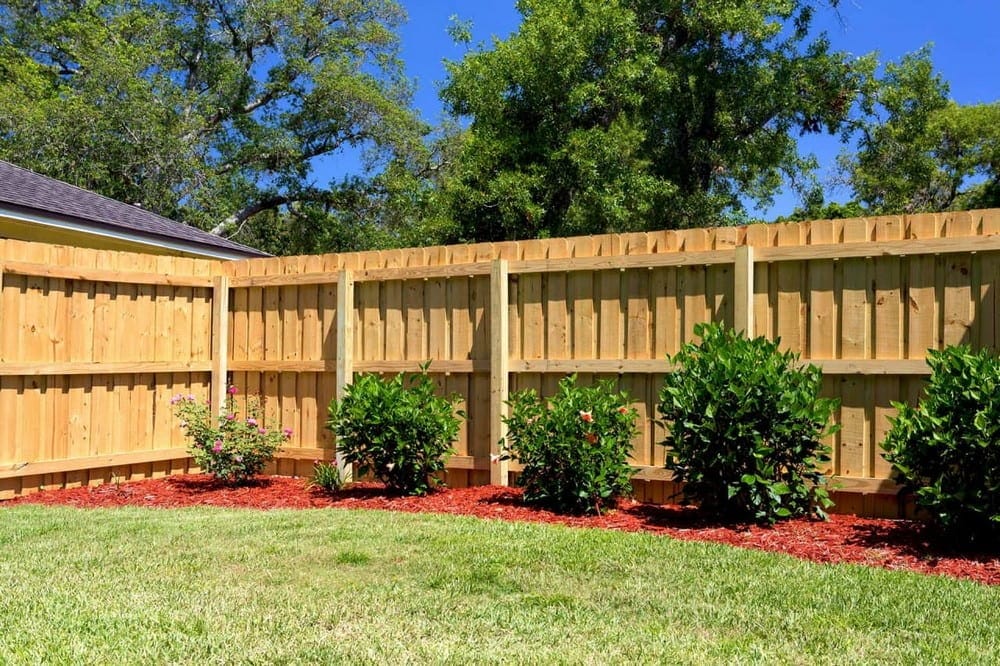
1. Wood Fences
Wood fences are a timeless choice, loved for their natural beauty and versatility. They can be customized to suit various styles, from classic picket designs to tall privacy fences. Wooden fences blend seamlessly with natural landscapes, making them an excellent option for homeowners who want a rustic or traditional aesthetic. Additionally, wood is highly adaptable and can be built into complex designs, adding personality to your property. With the right treatment and care, wood fences can maintain their charm for years.
Pros:
- Aesthetic Appeal: Wood offers a warm, natural look that enhances the charm of traditional and rustic-style homes. Its versatility allows for intricate designs, such as lattice tops or decorative post caps.
- Customizable: Stain or paint your wooden fence to match your home’s color scheme or landscape.
- Privacy: Solid wood panels provide complete seclusion, making it an ideal choice for privacy-focused homeowners.
- Eco-Friendly: When sourced responsibly, wood is a sustainable material.
Cons:
- Maintenance-Intensive: Requires regular staining or sealing to protect against rot, insects, and UV damage. Neglect can lead to a shortened lifespan.
- Vulnerability to Weather: Extreme weather conditions can cause warping, splitting, or cracking over time.
- Higher Long-Term Costs: While affordable initially, ongoing maintenance adds to the overall expense.
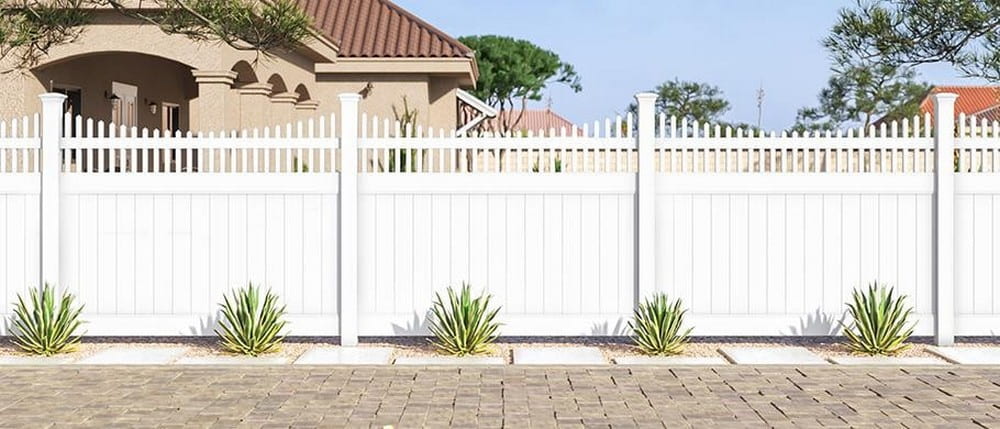
2. Vinyl Fences
Vinyl fences are a modern option known for their durability and low maintenance. They are popular in suburban settings and are often used for privacy and decorative purposes. Unlike wood, vinyl offers a polished, clean appearance that stays consistent over time. Homeowners appreciate its ability to withstand extreme weather conditions without losing its structural integrity, making it a reliable choice for many climates.
Pros:
- Low Maintenance: Unlike wood, vinyl doesn’t require staining or painting. A simple wash with soap and water keeps it looking pristine.
- Durability: Vinyl is resistant to moisture, pests, and rot, making it suitable for various climates.
- Variety of Styles: Available in a range of colors, textures, and designs, including privacy panels and semi-private options.
- Long Lifespan: With proper care, a vinyl fence can last 20+ years.
Cons:
- Higher Initial Cost: The upfront expense is higher compared to wood.
- Limited Repairs: Damage to a vinyl panel often requires full replacement.
- Environmental Impact: Vinyl is made from PVC, a material that’s not biodegradable, raising concerns for eco-conscious homeowners.
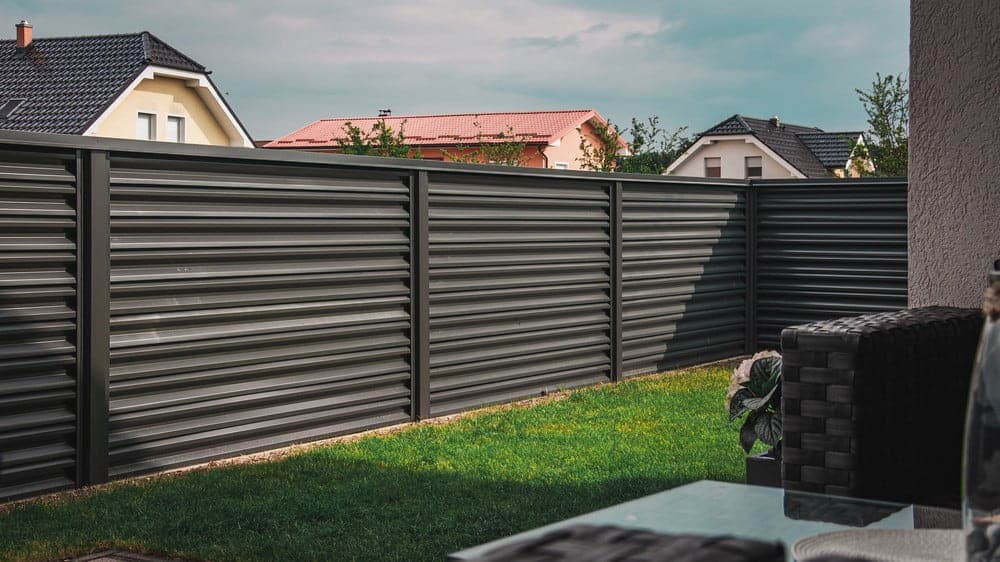
3. Aluminum Fences
Aluminum fences are lightweight, rust-resistant, and favored for their ornamental designs. They are often seen around pools or as decorative boundaries. Aluminum’s sleek appearance and customizable options make it a favorite for homeowners seeking an elegant touch. While it doesn’t provide much privacy, its durability and weather resistance make it a practical choice for open spaces.
Pros:
- Minimal Maintenance: Aluminum does not rust, making it easy to maintain with periodic cleaning.
- Decorative Appeal: Offers a sophisticated look with customizable designs that can mimic wrought iron.
- Durable in Various Climates: Resists corrosion, making it suitable for wet or coastal areas.
- Eco-Friendly: Often made from recycled materials, contributing to sustainability.
Cons:
- Limited Privacy: Open designs mean aluminum fences are not ideal for seclusion.
- Moderate Strength: While durable, aluminum can bend under heavy impact.
- Costly for Ornamental Designs: Intricate patterns and finishes can significantly increase costs.
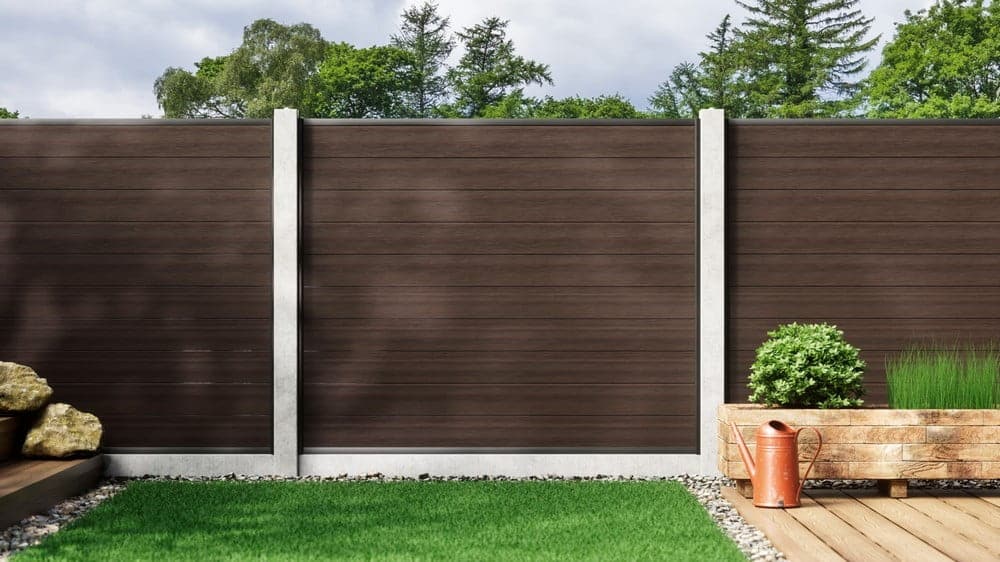
4. Composite Fences
Composite fences combine the aesthetic of wood with the durability of synthetic materials, offering a high-end and eco-friendly option. This type of fencing is ideal for homeowners who love the appearance of wood but don’t want the hassle of frequent maintenance. Composite fences are resistant to fading and warping, providing a long-lasting solution with a refined appearance.
Pros:
- Durability: Resistant to rot, pests, and weather damage, making it ideal for long-term use.
- Low Maintenance: No staining or sealing is required, and occasional cleaning suffices.
- Aesthetic Flexibility: Mimics the appearance of natural wood while offering modern color options and finishes.
- Eco-Friendly: Made from recycled materials, including wood fibers and plastic.
Cons:
- High Initial Cost: Among the most expensive fencing materials due to its durability and design.
- Heavy Weight: Installation can be more labor-intensive and costly.
- Limited Customization: Less versatile for intricate or decorative designs.
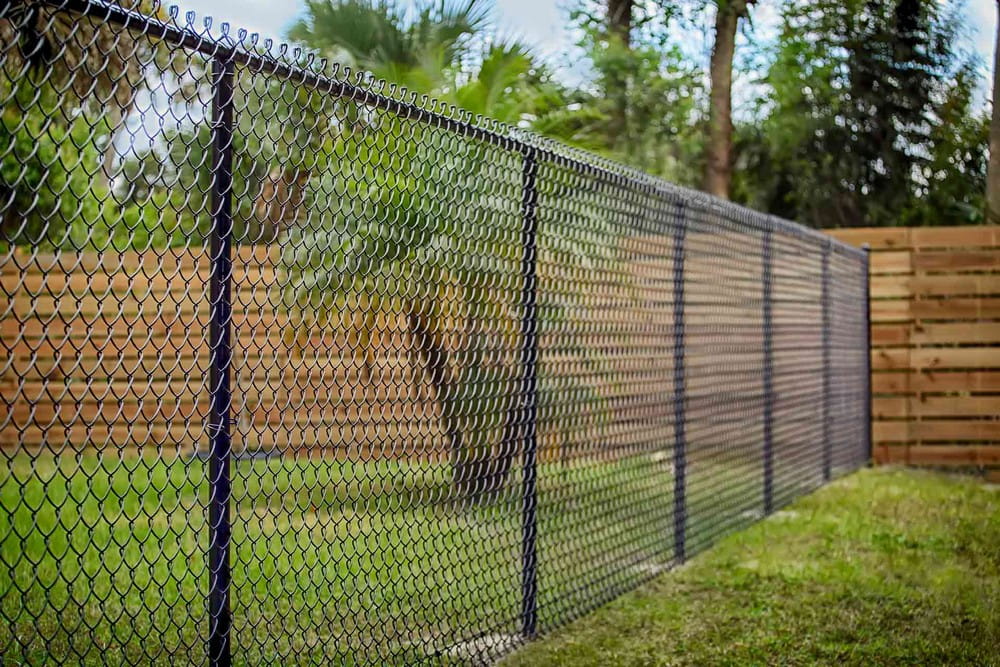
5. Chain-Link Fences
Chain-link fences are functional, cost-effective, and often used for securing larger properties or industrial areas. While they may lack aesthetic charm, their practicality makes them a popular choice for backyards, playgrounds, and commercial spaces. Adding slats or plants can improve their appearance and privacy.
Pros:
- Affordable: One of the most budget-friendly options available.
- Durable: Galvanized coatings prevent rust, ensuring longevity.
- Low Maintenance: Requires little upkeep, making it ideal for large-scale installations.
- Quick Installation: Simple design allows for fast and efficient setup.
Cons:
- Lacks Privacy: The open design does not provide seclusion unless enhanced with privacy slats or vegetation.
- Industrial Look: May not complement residential aesthetics.
- Limited Customization: Few options for altering its appearance.
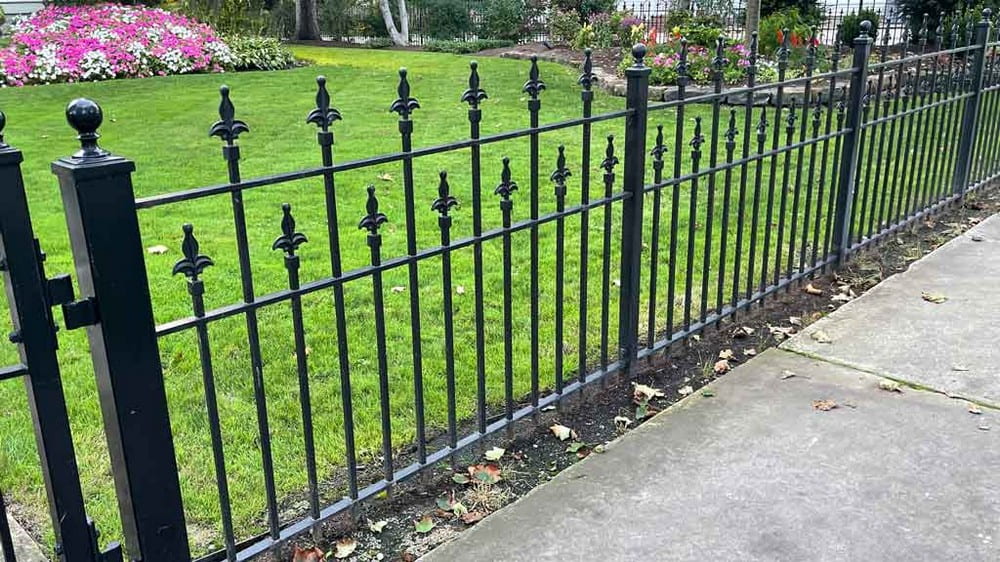
6. Wrought Iron Fences
Wrought iron fences are renowned for their elegance and strength, often associated with upscale homes and historic properties. Their intricate designs add a touch of sophistication to any property, making them a preferred choice for ornamental purposes. With proper maintenance, wrought iron fences can become a defining feature of your home.
Pros:
- Highly Durable: With proper care, wrought iron fences can last for decades.
- Aesthetic Appeal: Offers a sophisticated and timeless look with ornate designs.
- Security: Hard to breach due to its strength and custom height options.
Cons:
- Expensive: High material and installation costs.
- Rust-Prone: Requires regular maintenance to prevent corrosion.
- Limited Privacy: Open designs make it unsuitable for those prioritizing seclusion.
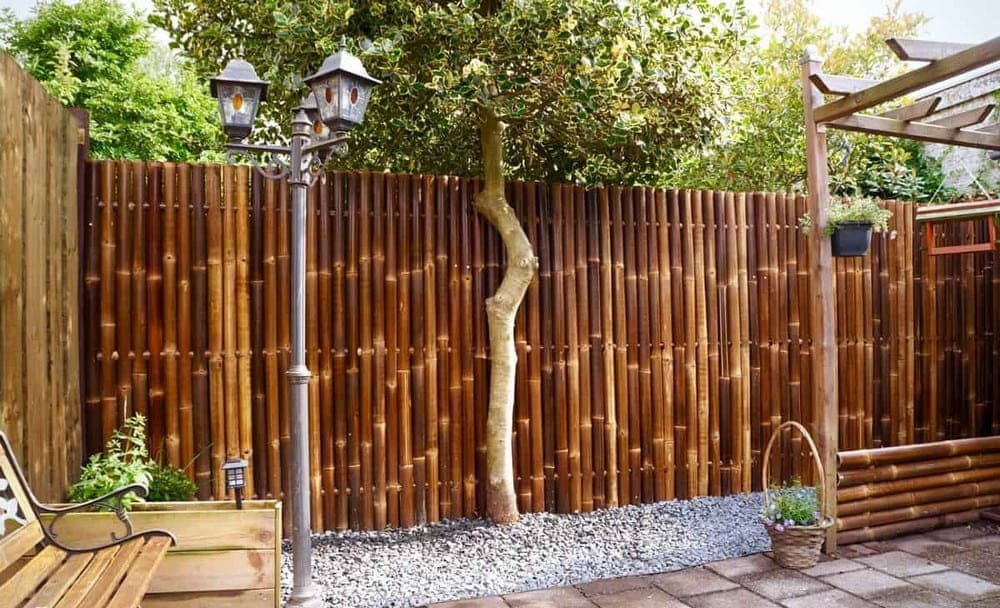
7. Bamboo Fences
Bamboo fences are an eco-friendly option that adds a tropical or natural vibe to your outdoor space. These fences are lightweight and provide a unique aesthetic that blends beautifully with gardens and outdoor retreats. Bamboo can be used as panels or woven designs, offering flexibility in style.
Pros:
- Sustainable Material: Bamboo is fast-growing and renewable, making it an eco-conscious choice.
- Aesthetic Appeal: Provides a unique, organic look that complements gardens and outdoor retreats.
- Lightweight: Easy to transport and install.
Cons:
- Weather Vulnerability: Susceptible to moisture damage and splitting in extreme conditions.
- Maintenance: Requires sealing to prolong its lifespan.
- Durability: Not as long-lasting as other materials like metal or vinyl.
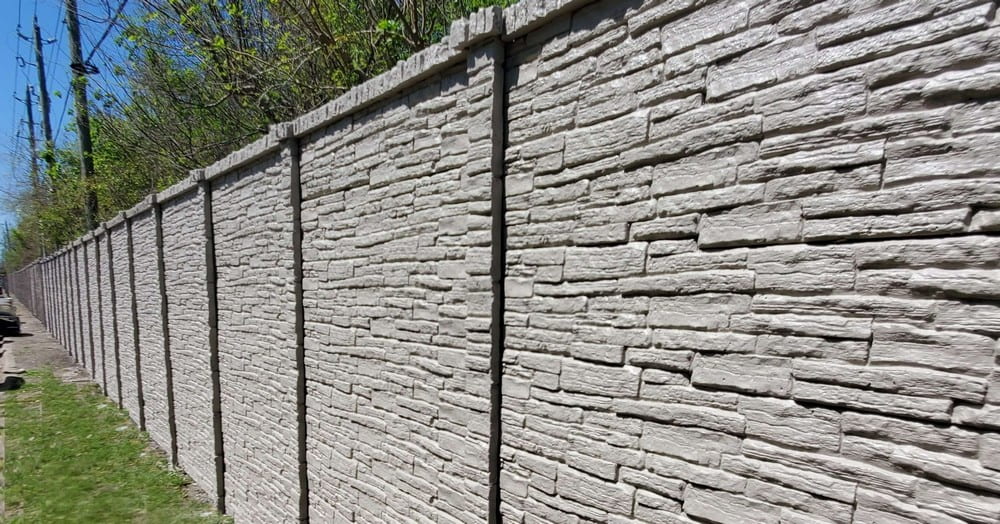
8. Stone or Masonry Fences
Stone or masonry fences are a premium option, offering unmatched durability and an elegant appearance. These fences are perfect for creating a sense of permanence and grandeur, and they also serve as effective sound barriers in noisy environments. Each stone fence is unique, adding a bespoke touch to your property.
Pros:
- Exceptional Durability: Can last for centuries with minimal wear.
- Aesthetic Excellence: Provides a high-end look with various stone or brick options.
- Sound Barrier: Excellent for reducing noise in urban or busy areas.
- Low Maintenance: Requires little upkeep compared to other materials.
Cons:
- Expensive: High material and labor costs make it one of the most costly options.
- Time-Consuming Installation: Requires skilled labor and significant time to construct.
- Heavy Weight: May require reinforced foundations, increasing costs.
Making the Right Choice
When choosing a residential fence, it’s essential to consider your priorities. Are you looking for privacy, security, or style? Understanding the pros and cons of each material will help you select the best option for your home. Factors like climate, budget, and maintenance preferences should also guide your decision.
Residential fences not only provide functionality but also contribute to the character of your property. By selecting the right type, you can enjoy a beautiful, secure, and long-lasting addition to your home.



